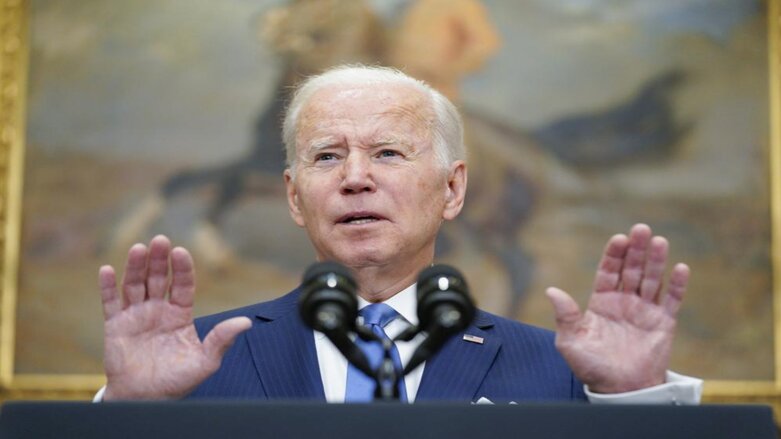Biden proposes new large aid package for Ukraine, as Russian threats continue

WASHINGTON DC (Kurdistan 24) – In a major address on Thursday, US President Joe Biden announced he would be seeking Congress's approval to fund a new, major initiative—$33 billion—to support Ukraine's defense against Russia's ongoing assault.
The new money will more than double the support provided to Kiev by Washington in the two months since the war began. It is intended to last through October when a new fiscal year begins.
The large request is seen as signaling a long-term US commitment to what it expects to become a protracted conflict.
Biden also asked Congress for the authority to seize and sell the assets of Russian oligarchs, such as real estate, luxury yachts, etc. The Biden administration will use the proceeds for the benefit of the Ukrainian people.
Such a move is likely to be popular with the public, while it will provide an opportunity to highlight the corruption surrounding Russian President Vladimir Putin and his close associates—as long detailed by Russian activists, like the jailed opposition leader, Alexei Navalny, as well as Western scholars, such as the late Karen Dawisha in her 2014 book, Putin's Kleptocracy.
US not Dissuaded by Continuing Russian Threats, as Biden rejects Appeasement
The latest US moves come as Russian officials continue to repeat veiled threats against western support for Ukraine. On Thursday, Foreign Ministry Spokesperson Maria Zakharova complained, "The West openly calls on Kiev to attack Russia, using, among other things, weapons received from NATO countries."
"We advise you not to further test our patience," she pointedly added.
Zakharova's statement came after a threat from Putin on Wednesday, warning that if any party created "unacceptable threats for us that are strategic in nature," Russia's response would be "lightning fast."
That threat, in turn, followed one the week before, in which, on the occasion of a test launch of Russia's latest intercontinental ballistic missile, Putin asserted, the missile "will make those who, in the frenzy of rabid and aggressive rhetoric, are trying to threaten our country, think twice."
Initially, the Biden administration was inhibited from supporting Ukraine by concern about "provoking" Putin. Those old enough to recall the threats that Saddam Hussein made to Kuwait in the summer of 1990 about "stealing" Iraqi oil will also recall Kuwait's costly mistake: it hesitated to "provoke" Saddam and decline a US offer to send troops there, as a warning to the Iraqi leader and deterrent against any aggression.
Of course, we know what happened next. Iraqi forces crossed the border and in one night—between the setting and the rising of the sun—occupied the entire country.
There is a counter-argument to the notion that one should avoid "provoking" figures like Putin and Saddam: namely, appeasement does not work. It can make the danger much worse because weakness invites aggression, or, more colloquially, the appetite grows with the eating.
Biden seems to have adopted the latter perspective. As he said in asking Congress for more funding for Ukraine, "The cost of this fight is not cheap, but caving to aggression is going to be more costly if we allow it to happen."
Russian Attack on Kiev Follows UN Visit—Kills RFE-RL Journalist
On Wednesday, UN Secretary-General Antonio Guterres visited first Moscow and then Kiev in an attempt to broker a humanitarian agreement.
Guterres had no immediate success. Indeed, at the end of his trip, following his meeting with Ukrainian President Volodymyr Zelensky, he and Zelensky held a joint press conference.
The Portuguese diplomat made an oblique criticism of Putin, expressing his regret that the Security Council, where Russia wields a veto, had proven radically ineffectual in dealing with the Ukraine crisis.
Moscow's response was swift. After some weeks of calm in Kiev, when Russia's military operations had focused elsewhere, five missiles rained down on the Ukrainian capital after their press conference ended.
"Today, immediately after the end of our talks in Kiev, Russian missiles flew into the city," Zelensky later stated, as he called for "a powerful response."
Guterres, who still seems to entertain some illusions about Putin, was said to be "shocked" by the missile strike, although neither he nor any of his entourage was hurt.
One of those five missiles struck a Kiev apartment block. Vira Hyrych, a producer for Radio Free Europe/Radio Liberty, was killed, and ten other civilians were injured.
